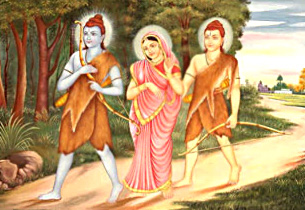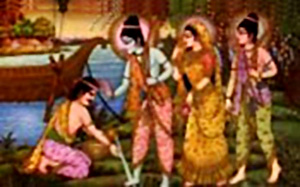 Exile for Rama has been described in Ayodhya Kanda. After getting to know about the two boons offered to Kaikeyi by Dasaratha long ago and the demand of Kaikeyi for the two boons in the form of his exile into the forest for fourteen years and the coronation of Bharata to the throne of Ayodhya, Rama decided to keep the words of his father and decided to go for an exile into the forest and told Kaikeyi to prepare for the coronation of Bharata. Hearing this, Lakshmana also decided to go with his brother into the forest and Sita, too, made up her mind to live in the jungle along with her husband. Thus, the journey of Rama, Lakshmana and Sita for the forest forms a major part of Ayodhya Kanda.
Exile for Rama has been described in Ayodhya Kanda. After getting to know about the two boons offered to Kaikeyi by Dasaratha long ago and the demand of Kaikeyi for the two boons in the form of his exile into the forest for fourteen years and the coronation of Bharata to the throne of Ayodhya, Rama decided to keep the words of his father and decided to go for an exile into the forest and told Kaikeyi to prepare for the coronation of Bharata. Hearing this, Lakshmana also decided to go with his brother into the forest and Sita, too, made up her mind to live in the jungle along with her husband. Thus, the journey of Rama, Lakshmana and Sita for the forest forms a major part of Ayodhya Kanda.
Sita`s Exile with Rama
Sita, after hearing from Rama about the coronation of Bharata and the banishment of Rama into the forest for fourteen years, told Rama that, as a wife she was bound to share the fate of her husband and therefore she would also go to the forest with him. She told that she would be happy with him in the jungle and would live there eating roots and fruits and follow her husband every where. However, Rama tried his best to dissuade her by recounting a tale of hardships and dangers endured by forest-dwellers, as of fierce and wild animals, scanty food, poisonous serpents, and bed of leaves, arduous ritual, hunger, thirst, and fear. But Sita, with tears in her eyes, told him that these evils are like so many blessings to her if Rama is with her. She told that it was prophesied by Brahmins of her father`s house that she would dwell in a forest, and a yogini came to her mother when she was a girl and told the same tale.
She then told to Rama that as she was his wife, she would follow her in his happiness and sorrows and thus would accompany him to the forest and informed him that if she is not permitted to go to the forest then she would consume poison or burn herself in the fires or drown in the water. At last, Rama granted her desire to go to the forest along with him and asked her to give away her wealth to the Brahmans and fed the poor and made all ready for the way to the jungle.
Lakshmana`s Exile with Rama
After granting permission to Sita for the forest life, Lakshmana, with tears in his eyes, held the feet of Rama and told him he would also go with him to the forest and live with him as long as he lives there. He told that he would walk in the forest before him and clear the way for him and carry the basket and collect the daily fruits and roots. Rama could not dissuade Lakshmana by any argument and therefore asked him to take leave from all the relatives and ordered him to bring away the two suits of mail and burnished weapons given to him as bridal gifts by Janaka. He ordered to distribute his wealth amongst the Brahmans. Then Rama, Sita and Lakshmana went to farewell their father and the mothers.
Then a noble Brahman named Sumantra, seeing Dasaratha broken by grief, and moved to pity due to the decision to exile Rama into the forest, prayed Kaikeyi to relent, clasping his hands and using smooth but cutting speech told that the hearth of the noble lady was hardened, and she might not in any way be moved. But when Dasaratha wished to send Ayodhya`s wealth and men with Rama to the forest she paled and choked with anger, for she required that Rama should go destitute and that the wealth should belong to Bharata.
However, Rama told that wealth and luxury were not required in the forest. And he asked to bring dresses of bark, a hoe and basket. Then Kaikeyi brought a dress of bark, one each for Rama and Lakshmana and Sita. But Sita, clad in robes of silk, seeing the robe of a nun, trembled like a doe before the snare and wept. Then would they persuade Rama to leave Sita to dwell at home, abiding his return; and Vashishtha rebuked Kaikeyi and told that this was not in the boon that Sita would accompany Rama, rather Sita should rule the kingdom in the absence of Rama. Thus, Sita be well adorned and have with her cars and goods and servants when she follows Rama. Then Dasharatha gave her robes and jewels, and laying aside the dress of bark, Sita shone resplendent, while the people muttered against Kaikeyi, and Sumantra yoked the horses to Rama`s car. Rama`s mother Kaushalya bade farewell to Sita, counselling her in the duties of women, to regard her lord as God, though exiled and deprived of wealth. Then Rama, taking leave of Dasaratha and of his mothers, said with praying hands that if he had ever spoken discourteously, by lack of thought, or inadvertently done any wrong, then they should kindly pardon him. Then Sita, Rama, and Lakshmana walked sun wise thrice about the king and turned away.
Final Departure of Rama, Lakshmana and Sita from Ayodhya
Rama, Lakshmana and Sita, ascended the flaming car of gold, taking their weapons and coats of mail, the hoe and basket, and Sita`s goods bestowed by Dasaratha; and Sumantra urged on the goodly horses, swift as the very wind. Men and beasts within the city were utterly stricken with grief, and, bereft of wit, rushed headlong after Rama, like thirsty travelers seeing water. Even Kausalya, Rama`s mother ran behind the car. Then Rama said to the charioteer to move very fast so that he could not see his loved ones behind him. Soon Rama was far away, beyond the sight of men gazing at the car`s track.
 Meeting of Rama with Guha, King of Nishadha
Meeting of Rama with Guha, King of Nishadha
Driving for two days, Rama reached the boundary of Koshala, and turning back towards Ayodhya, bade farewell to the land and the people. Then they left Koshala, rich in wealth and Brahmans, and passed through other smiling lands until they reached the blessed Ganga River, crystal clear, resorted to by every creature, haunted by gods and angels, sinless and sin-destroying. There Guha, king of Nishadha, greeted them and fed their horses and kept guard over them all night, and when the dark cuckoo`s note and the peacock`s cry were heard at dawn he sent for a splendid ferry-boat. Then Rama asked for starch-paste, and he and Lakshmana dressed their hair in matted locks, after the fashion of hermits dwelling in the forest. Rama said farewell to Guha, and Sumantra the charioteer he requested to go back to Ayodhya, though he prayed to follow farther. Then as they crossed, Sita prayed to Ganga for safe return after fourteen years, vowing to worship that River-Queen with many offerings. That night they dwelt by a great tree on the farther bank and ate boar`s flesh slain by Rama and Lakshmana.
Both the brothers vowed to protect Sita and each other, whether in solitude or amongst men. Lakshmana should walk in front, then Sita, and Rama at last. They talked also of Ayodhya, and Rama, fearing Kaikeyi`s evil heart, would have Lakshmana return to care for Kausalya and he railed against Kaikeyi and somewhat blamed his father, swayed by a woman`s will. But Lakshmana comforted his brother so that he wept no more. He told that he had no desire to see anyone if his brother Rama was not there. Then Rama was comforted, and slept with Sita under the banyan-tree, while Lakshmana watched.
Rama`s Meeting with Bharadwaja
The next day, they reached the holy place where Ganga joins with Yamuna River at Prayag. There, they came to the hermitage of Bharadwaja, guided by the wreathing smoke of his sacrificial fire, and they were received a grand welcome. Bharadwaja counselled them to seek the mountain of Chitrakuta, ten leagues from Prayag where they could stay. There are herds of elephants and deer and they could be delighted to stay there amidst the woods. Then he taught them how to come there, crossing the Yamuna and passing the great banyan-tree Shyama, the Dusky, and thence by a fair sandy road through the forests. So Rama and Sita and Lakshmana took leave from Bharadwaja and crossed the Yamuna River by a raft, and came to Shyama. Immediately on arrival there, Sita prayed to Yamuna, vowing many offerings of kine and wine for Rama`s safe return. To Shyama Sita also prayed, saluting him with folded hands. Then as they went along the forest path, Sita, seeing trees and flowers unknown, asked Rama many questions, as of their names and virtues; and Lakshmana brought her flowers and fruits to please her and the rippling streams, and the cries of peacocks and cranes, and the sight of elephants and monkeys delighted her.
The second day they reached the Chitrakuta hill, where was the hermitage of Valmiki. Greeted by that rishi, Rama told him all that had befallen. Then Lakshmana fetched divers sorts of wood, and those brothers built a goodly house with doors and thatched with leaves. Then Lakshman slew a deer and cooked it, and Rama made ritual offerings to the divinities of that very place, and after communion with the deities he entered the well-wrought thatched house with Sita and Lakshmana, and they rejoiced with happy hearts and cast off grieving for the kingdom of Ayodhya. Thus, one of the parts of Ayodhya Kanda ends with the exile of Rama, Lakshmana and Sita into the forest and their subsequent settlement in a hut prepared by Rama and Lakshmana.



















